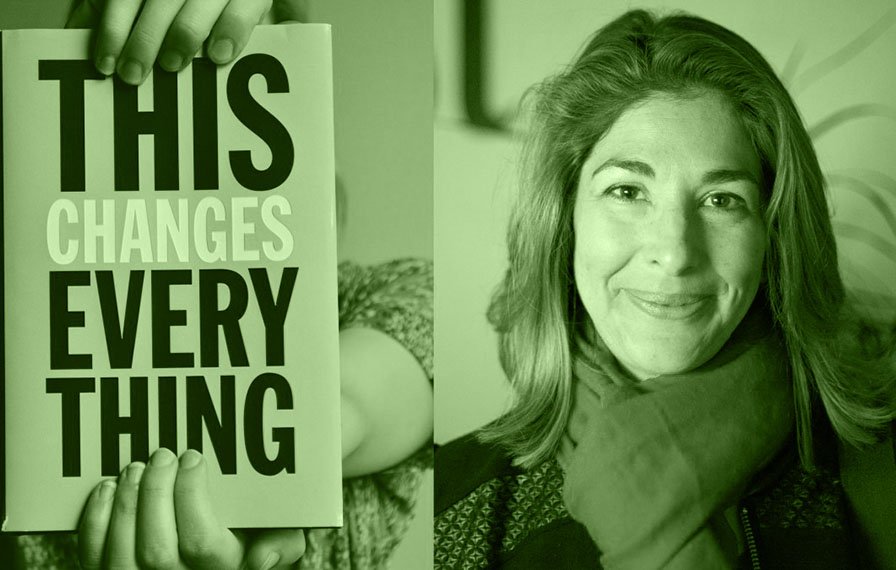If you want to read a book on climate change that addresses the situation a little differently than other books, you may want to start with Naomi Klein’s “This Changes Everything: Capitalism vs the Climate.” Klein’s writing is clear and compelling and the fundamental premise of the writing is that there are two different views of the world that leads to a climate change issue. Mike Childs (2014) of Friends of the Earth argues that Naomi Klein does not “mince her words,” in explaining all of this. In particular, one of the themes is that there is a right wing view that government is bad and free markets are good, leading to a premise that man has command and control over nature. On the other side of the coin, is the predominantly left wing view that the government has a duty to prevent environmental harm.
The problem is, explains Childs in reviewing Klein’s book is that in a fight between capitalism and the climate, the balance is not equitable. In fact it is likened to a “David and Goliath” type of situation. That is because the balance of power is far more heavily weighted towards capitalism. That is where the wealth is. The climate doesn’t get a look in. Nor do all the movements that are splintered and battling for change, such as indigenous groups, grassroots activists and the labour movement, according to Klein. At the same time, Childs explains that Klein is critical of the US environmental groups (not including Friends of the Earth and Greenpeace) as these have generally accommodated free-marketers. Childs view having reviewed the book is that there is a need to focus on sharing, reduce the idea that ecosystems can be dominated by us and drive genuine public participation in change, by helping people to understand concepts like fracking and why they are so damaging.
In the following short video Klein addresses the main reasons that led her to write about climate change:
The interesting quality of Klein’s book is that it is aimed to a broad audience. As Jenny Turner (2014) of The Guardian explains: “Klein wants this book to be read by people who don’t read climate-change books – it addresses a potential catastrophe yet is calm and welcoming.” It is explained by Turner that the book does not advocate the view point that humans cause climate collapse and that neither does carbon. Rather, she explains, capitalism leads to an approach where people seek out resources for exploitation. This is a mind-set, she explains, that needs to be changed. The unfortunate problem is that we are “locked in” to this capitalistic approach, not just politically but also culturally and physically. We want to buy stuff. That means that organisations want to make stuff for us to buy so they can make money. And it is that which leads to exploitation.
Turner outlines how Klein explains that capital separates people out from the world around them, and that this began at the time of the Industrial Revolution when steam power was first discovered and leveraged. Other aspects that have not helped include problems such as deregulation, tax-cutting and privatisation of public space, according to Klein. All of this has created severe challenges for the climate movement, and it is Klein’s view that the climate needs to find new ways to take on capitalism if it is to win this war.
Klein points out that climate change is further complicated by the fact that the evidence can be quite localised in some cases. Examples given are flooding in the Maldives, and gas flares in the Niger Delta. These are places that are poor and that do not necessarily have a high profile. The people that live in those areas do not have much power. Yet the rich do not get to see this first hand. Klein explains that when they do they are “sickened” by it so they decide to stop seeing it rather than addressing it.
Klein argues that climate action can create jobs as well as build communities. However, it is more labour intensive. That makes it hard for capitalism to get interested in it. One can only hope that Klein’s words do not fall on deaf ears as so many climate change books before it have. Launching the book a week before the UN climate summit in 2014 can only help her cause. Time will tell if people actually sit up and take notice of her words.

Paula Newton is a business writer, editor and management consultant with extensive experience writing and consulting for both start-ups and long established companies. She has ten years management and leadership experience gained at BSkyB in London and Viva Travel Guides in Quito, Ecuador, giving her a depth of insight into innovation in international business. With an MBA from the University of Hull and many years of experience running her own business consultancy, Paula’s background allows her to connect with a diverse range of clients, including cutting edge technology and web-based start-ups but also multinationals in need of assistance. Paula has played a defining role in shaping organizational strategy for a wide range of different organizations, including for-profit, NGOs and charities. Paula has also served on the Board of Directors for the South American Explorers Club in Quito, Ecuador.












